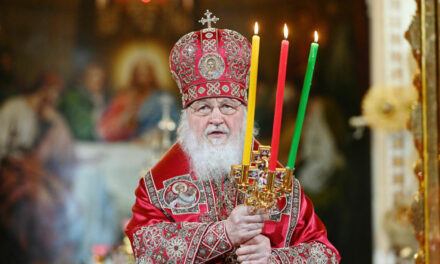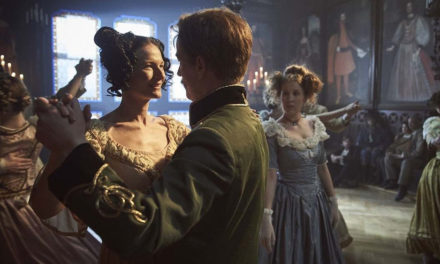"A nation that does not know its past does not understand its present, and cannot create its future!"
The news is that most of today's 10-25 year olds - you who use your smartphone for hours every day - know very little about the exciting and adventurous world of Hungarian and universal history. The school curriculum, which, if you had learned it, would be sufficient for a general historical knowledge. If not, or if you only learned it superficially, it's only enough for a bad stand-up comedy joke!
Here are some examples of what I mean. Question: Who was the wife of King Saint István?
Answer: Bajor Gizi (If you didn't understand this now, then you really don't know who the wife of our first king was, nor who Bajor Gizi was.)
Question: Name Hungarian governors!
Answer: Árpád Göncz and György Fráter (This is not much worse than Bajor Gizi.)
A reminder of who were the important governors of Hungary

János Hunyadi, Lajos Kossuth and Miklós Horthy were the best-known and most important governors in the history of Hungary
Question: When was the Soviet Union founded? (So that not only Hungarian history is disgraced.)
Answer: In the 18th century.
Question: And when did it stop?
Answer: In the 1450s and 60s. (There is a problem not only with historical knowledge, but also with logic and the world of numbers.)
Question: What do you know about the Pope? (So that religious topics are not left out.)
Answer: The Pope is of the Reformed religion. (This is also bad for a joke.)
Question: Who is the leader of Eastern Christianity?
Answer: The Tibetan lama.
Question: What does the Ten Commandments say?
Answer: Love your neighbor's wife! (The list of examples is endless.)
You might think, my young friend, that all these are good jokes, and that they were only uttered in an informal conversation between friends on the street, or that someone made them up. However, the sad situation is that these questions and answers were quoted from university admissions . We continue the series with a few more linguistic, geographical and everyday examples.
Question: How does Hamlet end?
Answer: The actors bow.
Question: What is the official language in Switzerland?
Answer: Swedish, because Switzerland borders Sweden .
Question: What freedoms do you know?
Answer: There are two freedoms. The religious and the sexual.
I assume, my dear young friend, that you, who want to enter a secondary school, then graduate there, and continue your studies at the higher education institution of your choice, are aware that knowledge is not a disadvantage. Moreover, without knowledge, you will have at most one piece of paper, which is enough for few useful things. A very true and current saying is known even today: Knowledge is power!
Despite the above examples, you should know something. Despite the above, the knowledge of a young Hungarian is above the knowledge of your western contemporaries, who are still so much envied. (I think you have heard about it, or you may even have experienced it yourself, that a medium-achieving Hungarian schoolboy, for example, moving to America, soon rises to the top of the class, if not the top of the class.)
What is the secret of this?
- One explanation is the Hungarian education system, . Which, of course, could and should be improved and changed a lot, but nevertheless it only gives a stable basic knowledge. Do not believe the Pisa measurements, which are often misleading and set up according to Western values and interests.
- But the real secret lies in the unparalleled richness of the Hungarian language. It is well known that our language can depict the world in such a diverse, sensitive, rich and, in short, beautiful way that only very few languages can. By using the nuances of our language, we can say and imagine almost anything. can be seen, among other things, with regard to the Hungarian folktale empire (It is well known that János Arany's poems cannot be translated into many other foreign languages due to his rich use of words and turns of phrase.) Unfortunately, we Hungarians do not exploit this sufficiently in everyday life. Because it requires sophistication, knowledge, attention, and selective wording.
- The " first version" of Hungarian writing is the runic script . The writing that was destroyed for centuries, and then for decades made the very generations that live and create today feel that runic writing is not even part of our history, it is just a side note
The compacting effect of the Hungarian language is unique. What is the explanation for this? Our language is able to indicate the unique nuances of time and action with its innumerable verbs and verbs that are participative and practice, as well as beginning, cultivating, active, and verbs. Conjunctions are used both before and after words, the Hungarian language is also capable of this miracle. It is no coincidence that learning our language is a difficult task for foreigners. And we haven't talked yet about the structure of subject and object conjugation that further enriches our language.
Languages, including Hungarian, carry special knowledge. The language of agricultural and animal-breeding peoples is particularly rich, as we use different names for plants and animals based on their age, color, sex, species, maturity, cultivation, and breeding. (Example: herd, stud, gulya, flock, rudli, swarm, flock, herd, etc.)
/The Earth's population speaks nearly seven thousand languages, but its distribution is very uneven. The ten most common languages are used by 43% of the seven billion people. 690 million people live in Europe in 45 countries. Of the 63 spoken languages, 85% of Europeans speak 12 languages, the remaining 15% speak around 51 languages. Hungarian is the 14th most spoken language on the continent./
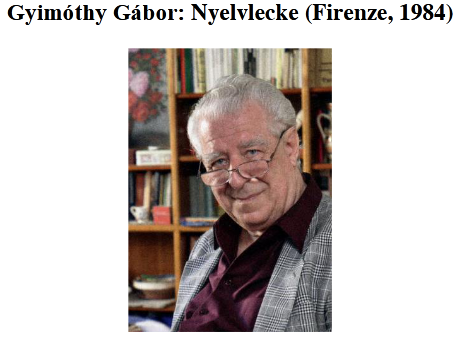
During an Italian lesson / Here is the question:
What kind of language is Hungarian, / how did it get to Europe? I told you, as I knew, / What the Hungarian is capable of.
I told you that there are many, many rags, / And what some of them cover, And what lies in their vocabulary, / The many shades,
Let's just take it here as an example: / Man, animal, how are you doing? I told you when we're going, / When I say I'm going.
It's drunk that you're rambling with us, / And what if you're just walking, Why do I say you're stumbling / You're walking or shuffling,
And the couple in love walking, / Why are they talking? The wild boar, when it runs, / It doesn't trot, but it trots – and Although it's almost the same in shape / Why is it different?
I would have even said, / He who runs, why doesn't he slow down? Why doesn't he gallop across the field, / But he gallops somewhere. He who limps, why doesn't he float, / And it's not a flutter, - As it's not just a lame person who limps, / And a flutter is not a flutter!
What does a horse do when it neighs, / Or when it gallops? And the kvass, when he turns sad, / Or even wanders. The one who dodges takes a leg, / The startled deer runs away.
He who comes in does not break in... / How can I say it in another language?
It would have been nice to illustrate, / Stumbling as it goes, Or what is it like to be happy? / A word – a picture – a flavor! Who "slattyog", why not "loaf"? / Running where are you running? Who wanders, why not wander? / And who knocks, where does he stay? Why doesn't Bandukólo bakkat? / And when he mumbles, what does he mumble?
He who licks, or he gets, / Or he licks and tots?
It's not just a shadow that glides, / And it's not just the vehicle that rolls, It's not just the flood that rushes, / It's not just the car that jogs. He who cheats, does not clatter, / He who "slicks" first, He who stumbles, does not "snap", / If he does: the tale is deceiving! That the dog sneaks, / Snorts and then lies down,
And if you rub on it, it gets scratched. / How do I say this in Italian? Another sneaks up on it, / It scurries and then spreads out. You're overreacting, you're procrastinating, / How do I say this in German? A vagabond wanders here, / He sings, heaves, he wanders, He rattles, then wanders away, / And he no longer bothers.
But another one wanders here, / – Tells a wandering woman – Here she wanders, here she wanders... / How is this in French?
And why does the crowd pour in, / When it flows, or marches, Or flows and doesn't flow, / How can I say this in English?
He who sneaks, why doesn't he sneak, / Or why doesn't he walk?
I know all this only in Hungarian, / And it can only be in Hungarian...!
We believe, we must believe, that our unique language our culture with strong foundations fact that Hungarians own more than any other nation, around 250,000 folk songs and tens of thousands of folk tales, To quote our elders: “We are black belt survivors.” Our history is proof of this.
The Hungarian destiny, the Hungarian past, present and future can be expressed in one sentence: Those who do not know their past cannot prosper, navigate in the present and have no idea about planning and building the future.
Cicero's saying recorded in Latin is "Historia est magistra vitae." in Hungarian it sounds like this: History is the teacher of life.
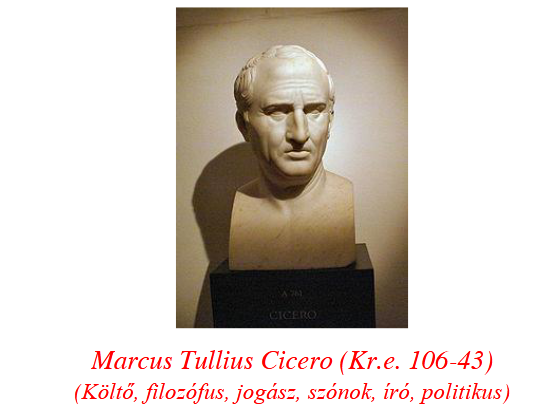
History and the science of history have logic and laws . What I mean? In the 90s, the "accusation" was often made against history teachers in teachers' rooms that this subject - and of course science - cannot be taken seriously, because it always changes as politics dictates, as systems change. Enough of mathematics and other real sciences! It is stable, it is not exposed to prevailing winds. (I would like to note that according to a humorous video indicating the rapid changes in today's world, 2+2 is no longer 4, but 22. Because the teacher insisted on 4, she was dragged and fired from her job. Why? Because the young student and his parents have the right to say that 2+2=22!) Returning to the changes in history, that's what makes it interesting and exciting, and that's why it should be dealt with, because it gives answers to the changes in the world and people's thinking.
This is what the debates and contradictory arguments of the past three decades are all about. (I will mention a well-known example of the changes. The popular meeting point, Moskva tér in Buda, got the name Kálmán Széll back. It got it back because that was its original name! Generations grew up with the name of Moskva tér written in their minds. Many protested because of changing the name of the square back. Who is right? Think about if, for example, your name - the names of your parents, grandparents - had been arbitrarily changed by an office against your will. Could you accept it?) For everyone - who cares about the future of their country, the fate of their family, children and grandchildren – you have to face the facts. It is not enough to be satisfied with the short "analyses" of news portals - be they the mouthpieces of any political side. Dealing with history takes a lot of time . It contains many contradictions, but whoever feels its taste and beauty cannot get rid of it. Previously, history was one of the three most popular subjects in the Hungarian school system – taking into account the average of students in the capital, cities and villages. Today, unfortunately, this is no longer the case. Our task is to raise our people's "general knowledge" of history to the level it deserves. This requires at least two things. One is that at least two hours of history per week should remain in the Hungarian school system. Because following the intentionally wrong Western example, there have already been attempts to delete history from the timetable. Fortunately, the majority of Hungarians vehemently protested against this. The other is that there should be teachers, parents, lecturers, filmmakers, and historians who take the research and transmission of history as their heart, but above all the care and preservation of the unique values of Carpathian Basin It certainly mental craftsmanship , but who wouldn't want to be one?
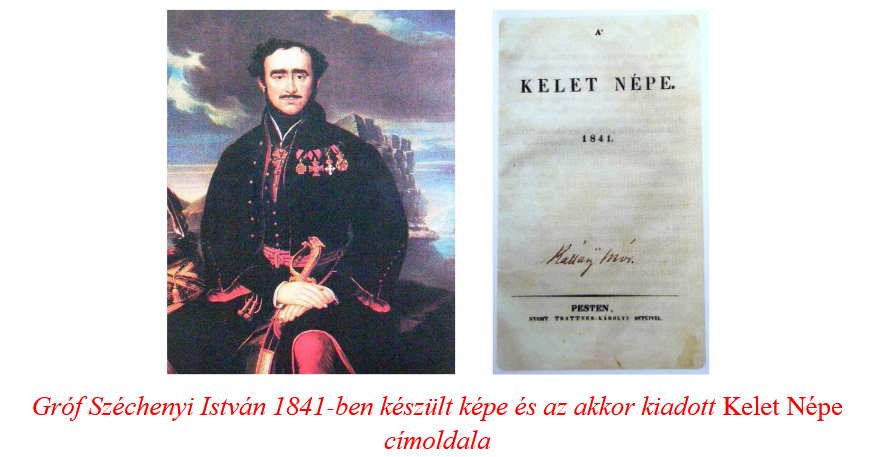
After all, Count István Széchenyi already wrote it in 1841, in the Eastern People: "The Hungarian people have no lesser vocation than to represent their characteristics hidden in Europe - the only heterogeneous offspring - hidden in the Asian cradle, never developed until now, never brought to maturity anywhere."
Fortunately, more and more Hungarian intellectuals are aiming to prove the Scythian, Hunnic, Avar, and Turkic origin of our people. This was never a secret, it was never a subject of debate, it was a natural knowledge of all Hungarians. The confusion has been caused by the Habsburgs and then by the foreign oppressors – Germans, Soviets, Slavs, Romanians – for more than a century and a half. There is no doubt that the writing of history can be manipulated, and therefore our enemies will do everything to take advantage of this opportunity.
Rákóczi tree, which once stood in its full splendor on the Parade, is a splendid proof that the canopy lives only as long as it is part of the cycle of nature, while its roots live and nourish the visible part of the tree above ground. If the roots die, it leads to the death of the tree.

Only the canopy of the tree whose roots are alive survives, as they feed the branches and leaves. Let's examine the roots of a dried tree, and we will see that it is no longer alive. This is the case with families, settlements, peoples and the entire country. If the roots of the given human community are not viable, it leads to the extinction and annihilation of the community. And what is at least as bad and fatal, merges into a foreign environment.
The 1 . part can be read here.
Ferenc Bánhegyi (We continue)

